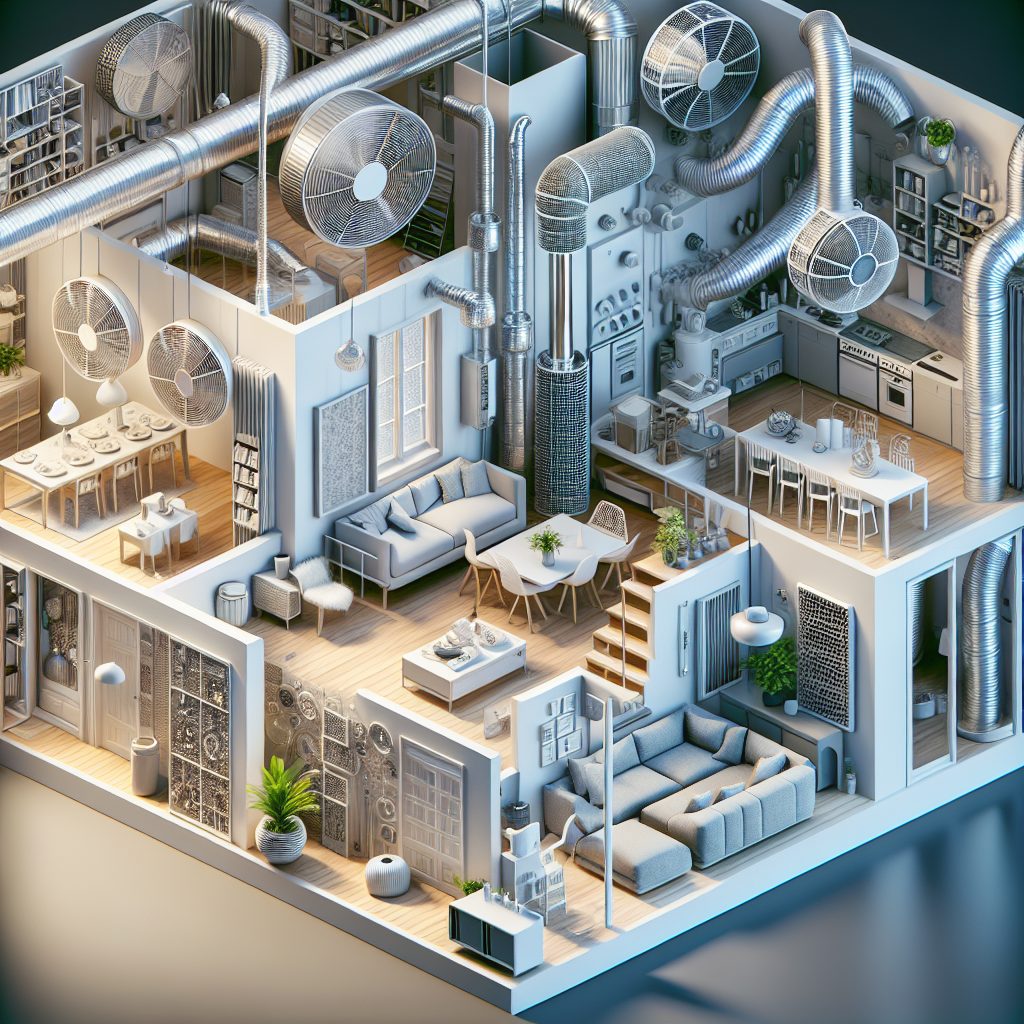
Residential ventilation is a crucial aspect of any home that often goes unnoticed. It refers to the process of replacing stale indoor air with fresh outdoor air, ensuring a healthier and more comfortable living environment. Did you know that the air inside our homes can be up to five times more polluted than the air outside? This startling fact highlights the importance of residential ventilation in maintaining indoor air quality. Not only does ventilation help eliminate odors and allergens, but it also removes excess moisture, reducing the risk of mold growth and improving overall air circulation. In this article, we will delve into the key takeaways of residential ventilation, exploring its various benefits and the different types of ventilation systems available.
One of the significant impacts of proper residential ventilation is the improvement of indoor air quality. With today’s tightly sealed homes, pollutants such as volatile organic compounds (VOCs) and allergens can become trapped indoors, leading to various health issues. The presence of these pollutants can cause respiratory problems, trigger allergies, and even contribute to long-term health issues. By introducing fresh outdoor air and expelling stale indoor air, ventilation systems effectively filter out these contaminants, providing healthier air for us to breathe. Additionally, residential ventilation plays a crucial role in controlling excess humidity levels, which can lead to the growth of mold and mildew. By removing excess moisture, ventilation systems help maintain a dry environment, preventing the formation of these harmful substances.
Now that we understand the significance of residential ventilation, let’s explore the key takeaways in more detail. First, we will discuss the different types of residential ventilation systems available, ranging from natural ventilation methods to mechanical systems. Next, we will delve into the benefits of each type, exploring how they improve air quality, control moisture levels, and enhance overall comfort. Additionally, we will look at the factors to consider when choosing a ventilation system for your home, including energy efficiency, noise levels, and installation requirements. So, keep reading to discover how you can enhance your indoor air quality and create a healthier living environment through effective residential ventilation.
Key Takeaways
1. Residential ventilation plays a crucial role in maintaining indoor air quality and promoting a healthy living environment for occupants. It is essential for removing pollutants, minimizing moisture buildup, and preventing the growth of mold and mildew.
2. Proper ventilation design should consider the size and layout of the dwelling, as well as the activities and lifestyle of its occupants. A balanced ventilation system, which combines both supply and exhaust ventilation, is recommended to ensure adequate air exchange without inducing drafts or discomfort.
3. The selection of ventilation equipment should be based on energy efficiency, noise levels, and maintenance requirements. Heat recovery ventilators (HRVs) and energy recovery ventilators (ERVs) are highly efficient options that can recover heat or coolness from the exhausted air, reducing energy costs and increasing overall comfort.
4. Ventilation regulations, standards, and guidelines vary across jurisdictions, making it essential for homeowners, builders, and designers to be familiar with and comply with local codes. Regular inspections and maintenance of ventilation systems are also crucial to ensure proper functioning and prevent potential health risks.
5. Increasing awareness about the importance of residential ventilation and incorporating it into building codes and regulations are necessary steps in promoting healthy living conditions. Adequate ventilation should be emphasized in both existing and new residential constructions to address indoor air quality concerns and enhance overall occupant well-being.
Why is Residential Ventilation Important for Your Home?
The Significance of Proper Residential Ventilation
Residential ventilation plays a crucial role in maintaining a healthy and comfortable living environment. Adequate ventilation helps remove indoor pollutants, such as volatile organic compounds (VOCs), allergens, and moisture, which can have detrimental effects on the air quality and occupants’ health. By improving the indoor air quality, residential ventilation helps reduce the risk of respiratory issues, allergies, and other health concerns.
The Benefits of Residential Ventilation
There are numerous advantages associated with having a well-ventilated home:
1. Improved Indoor Air Quality
Proper ventilation allows fresh outdoor air to circulate throughout your home, diluting and removing airborne pollutants. This ensures that you and your family breathe in clean and healthy air, free from harmful contaminants.
2. Moisture Control
Effective ventilation helps control excess moisture and prevents the buildup of condensation. By reducing humidity levels, ventilation helps inhibit the growth of mold, mildew, and bacteria, which can lead to structural damage and negatively impact your health.
3. Temperature Regulation
Residential ventilation helps maintain a comfortable indoor temperature by allowing fresh air to enter and stale air to exit. This helps reduce the reliance on heating or cooling systems, resulting in energy savings and lower utility bills.
4. Odor Elimination
Ventilation helps remove unpleasant odors from your home, whether they originate from cooking, pets, smoking, or other sources. Fresh air circulation helps refresh the indoor environment, ensuring a more pleasant living space.
5. Allergen Reduction
Proper ventilation helps reduce the concentration of allergens, such as dust mites, pet dander, and pollen, in your home. This is particularly beneficial for individuals with allergies or asthma, as it can alleviate symptoms and improve overall well-being.
Types of Residential Ventilation Systems
There are several types of ventilation systems commonly used in residential settings:
1. Natural Ventilation
Natural ventilation relies on openings, such as windows, doors, and vents, to allow fresh air to enter and stale air to exit. It is a passive form of ventilation that utilizes natural airflow.
2. Mechanical Exhaust Ventilation
Mechanical exhaust ventilation systems use fans to remove stale air from specific areas, such as bathrooms, kitchens, and laundry rooms. These systems help expel odors, moisture, and pollutants directly to the outside.
3. Balanced Ventilation
Balanced ventilation involves both supply and exhaust mechanisms. It utilizes fans to bring in fresh outdoor air while simultaneously removing stale indoor air, ensuring a well-balanced ventilation system throughout the entire home.
4. Heat Recovery Ventilation (HRV) and Energy Recovery Ventilation (ERV)
HRV and ERV systems aim to recover and transfer heat or energy from the outgoing air to the incoming fresh air. These systems help maintain comfortable indoor temperatures while ensuring efficient ventilation.
Maintaining and Enhancing Residential Ventilation
To make the most of your residential ventilation system, consider the following tips:
1. Regular Maintenance
Ensure proper functioning of your ventilation system by conducting regular maintenance, such as cleaning or replacing filters, checking fans, and removing obstructions.
2. Proper Use of Ventilation Systems
Understand how your specific ventilation system works and use it appropriately. Be mindful of recommended usage, such as running bathroom or kitchen exhaust fans while cooking or showering.
3. Adequate Ventilation in Key Areas
Pay special attention to areas prone to high moisture levels, such as bathrooms, laundry rooms, and basements. These areas often require dedicated ventilation to prevent mold and mildew growth.
4. Consider Advanced Ventilation Technologies
Explore advanced ventilation technologies, such as smart ventilation systems or energy-efficient models, which can enhance ventilation effectiveness while minimizing energy consumption.
5. Seek Professional Assistance
If you have concerns about your residential ventilation or require specialized solutions for unique circumstances, consult with a professional HVAC technician or ventilation expert.
Discover the Benefits of Proper Residential Ventilation Today!
Frequently Asked Questions
1. Why is residential ventilation important?
Residential ventilation is crucial as it helps in maintaining a healthy and comfortable indoor environment. It ensures the removal of stale air, pollutants, and excess moisture while providing fresh air to breathe.
2. What are the benefits of residential ventilation?
Proper ventilation in homes helps in reducing indoor air pollutants, preventing mold and mildew growth, controlling humidity levels, and improving overall indoor air quality. It also aids in regulating temperature and enhancing energy efficiency.
3. How does mechanical ventilation differ from natural ventilation?
Mechanical ventilation requires the use of mechanical devices such as fans, exhaust systems, and air purifiers to remove stale air and introduce fresh air. On the other hand, natural ventilation relies on natural air movements through open windows, doors, vents, or cracks in the building.
4. What types of residential ventilation systems are available?
There are various types of residential ventilation systems, including exhaust ventilation, supply ventilation, balanced ventilation, and energy recovery ventilation. Each system has its own method of air exchange and is suited for different scenarios.
5. How often should I change my air filters for optimal ventilation?
The frequency of air filter changes depends on factors like the type of filter, the level of air pollution, and the manufacturer’s recommendations. Generally, it is recommended to replace air filters every 1-3 months to maintain efficient ventilation and extend the lifespan of the HVAC system.
6. Can residential ventilation help reduce allergens and improve indoor air quality?
Absolutely! Proper ventilation, especially with the use of air purifiers, can help remove allergens such as dust, pollen, pet dander, and other airborne particles. This significantly improves indoor air quality and reduces the risk of allergic reactions and respiratory problems.
7. Is excessive ventilation a concern for energy efficiency?
While ventilation is essential, excessive ventilation without energy recovery mechanisms may lead to higher energy consumption. It is important to strike a balance between fresh air exchange and energy efficiency by utilizing systems that recover heat or employ energy-efficient technologies.
8. Can ventilation systems help with controlling odors in residential spaces?
Yes, ventilation systems play a crucial role in reducing unwanted odors inside homes. By exhausting stale air and introducing fresh air, proper ventilation helps eliminate cooking smells, moisture-related odors, and other unpleasant odors, contributing to a more pleasant living environment.
9. Do all rooms in my house require ventilation?
While some rooms may require more ventilation than others, it is generally recommended to have a balanced approach and ensure a minimum level of ventilation throughout the entire house. This helps maintain uniform airflow, even temperature distribution, and prevents the buildup of pollutants or excessive moisture in any particular area.
10. Can I install a residential ventilation system myself, or should I hire a professional?
While some simple ventilation measures can be done as DIY projects, it is advisable to consult a professional for the installation of a comprehensive residential ventilation system. A professional can assess your specific needs, recommend suitable systems, ensure proper installation, and provide maintenance guidelines.
Final Thoughts on Residential Ventilation
Ensuring proper ventilation in our homes is not just a matter of comfort; it is crucial for maintaining a healthy and inviting living space. Ventilation systems effectively remove harmful pollutants, control humidity levels, and provide fresh air to breathe, improving overall indoor air quality. By investing in reliable ventilation solutions and adhering to regular maintenance, we can enjoy a more comfortable living environment while safeguarding our health and well-being.
Remember, choosing the right residential ventilation system and following proper installation and maintenance procedures are key. Whether it’s employing mechanical ventilation or maximizing natural airflow, ventilation should be seen as an integral part of any home design or renovation project. Prioritizing residential ventilation paves the way for a healthier home and a higher quality of life.



